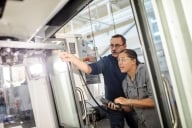You have /5 articles left.
Sign up for a free account or log in.
As a Political Science professor and researcher, my politics have been surprisingly sedate. Like many cynics, I have come to view Philippine politics unchanged from its metropole Manila orientation: personalist, elitist, and disconnected from serious discussions of policy. In our discipline, not much has changed since Lande, Agpalo, and lately, Sidel, Hutchcroft and others have given the same prognosis. With a Congress spending more of its time conducting hearings than actually legislating, a President who can’t take constructive criticism, and local governments captured by family dynasties, it’s hard to be optimistic. To me, politics is a spectator sport— you watch from a distance to distill examples for class materials in support of theory, a liability I have managed to avoid or side step in my research projects in the Mindanao area.
In the wake of Mamasapano (Maguindanao) incident that killed over 60 people (police special forces, Moro Islamic Liberation Front MILF fighters and civilians) in January 2015, my politics awoke from years of dormancy. In over 7 years of doing academic research and writing about Mindanao, I never realised until that point that I have become invested in people whose lives are lived in the conflict zone I have come to know personally— soldiers, rebels, community members, NGO workers, academics, the religious— and that my work rests fundamentally on a permissive atmosphere generated by years of fragile peace. I had just completed the field data gathering in December 2014 for an Asia Foundation (TAF) -funded project on local security arrangements in the infamous Salvo-Pagatin-Mamasapano-Shariff Aguak Box, and made the argument in a presentation of preliminary findings about external elements of the Philippine police (non-local) being a weak link, and of a failure to use established conflict prevention mechanisms (unlike their army counterparts and the Moro Islamic Liberation Front (MILF) ground command).
After the incident broke out, I felt how the acrimony and vileness in the discussions in print media and the legislative hearings have been impinging on the work of researchers like myself whose data depends so much on the trust and confidence our subjects have in us even as outsiders and presumably neutral academics. I was assisting an American researcher in Zamboanga in February, but her US DOD credentials and the fact that we are hosted by the American military stationed there made it particularly difficult to recruit interview subjects. The MILF contacts have all shut down; my officer contacts in Maguindanao have become busy with offensive operations; my US military point-of-contact shipped out early, and the whole US military special operations in Zamboanga closed shop. Meanwhile, I was tasked to complete the project write-up ahead of the timetable for discussion by the Third Party Monitors of the peace agreement between the government and the MILF. It was the most emotionally-draining report I have ever done in my entire career. Secretly, I knew it will be the last project of its kind I would ever undertake in Mindanao.
Having long considered my work in Mindanao as my minuscule contribution to the cause of peace, I was angry and very disappointed by the shallow polemics of pundits and politicians from Manila, at the utter disregard of mechanisms painstakingly crafted and nurtured for 14 years, and the sheer naivete that going after terrorists has no bearing on the peace process. I felt personally betrayed, even though I know that what I write will never ever be read by these people in whose hands crucial decision making lies. Among the ranks of those who have long toiled to establish empirical grounding to the cause of avoiding violent confrontations and the value of institutions in regulating behaviour in the Bangsamoro frontline, we will remain as before: invisible and outside of the politics that matter.








